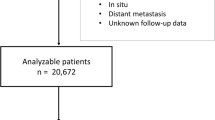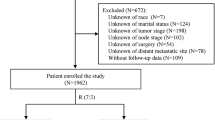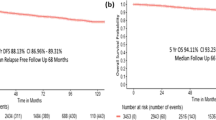Abstract
Between 1977 and 1993, 384 breast cancer patients were followed up post-operatively every 4 or 6 months with a serum tumour marker panel (CEA-TPA-CA15-3) and the usual imaging techniques. Twenty-eight patients were treated 13.5 +/- 10 months (mean +/- s.d.) before the clinical and/or radiological occurrence of distant metastases that were suspected because of an increase in the tumour markers (patients treated 'early'). Their outcome was compared with that of 22 similar patients who were treated only after a definite radiological diagnosis was achieved (patients treated 'not early'). The median survivals from mastectomy and salvage treatment were also compared for the two groups. The groups were similar for all the major prognostic factors (menopause, staging, hormone dependency). In the group treated 'early', the lead time from the tumour marker increase to the clinical and radiological signs of metastases was significantly longer than that of the group not treated 'early' (13.5 +/- 10 vs 3.4 +/- 2.8 months respectively; P < 0.001 by unpaired t-test). For patients treated 'early', the survival curves up to 30 months after salvage treatment and up to 72 months after mastectomy showed greater survival than those for the patients treated later (42.9% vs 13.6% and 42.9% vs 22.7% respectively; P = 0.04 in both instances). These data suggest that treatment triggered by rising tumour markers before clinical and/or radiological appearance of distant metastases can be useful in prolonging both the asymptomatic interval and the duration of response of some relapsed patients. Randomized prospective trials must be encouraged to confirm these data and to better evaluate the effect on the disease-free survival (DFS) and overall survival (OS) of 'early' salvage treatment protocols.
This is a preview of subscription content, access via your institution
Access options
Subscribe to this journal
Receive 24 print issues and online access
$259.00 per year
only $10.79 per issue
Buy this article
- Purchase on Springer Link
- Instant access to full article PDF
Prices may be subject to local taxes which are calculated during checkout
Similar content being viewed by others
Author information
Authors and Affiliations
Rights and permissions
About this article
Cite this article
Nicolini, A., Anselmi, L., Michelassi, C. et al. Prolonged survival by 'early' salvage treatment of breast cancer patients: a retrospective 6-year study. Br J Cancer 76, 1106–1111 (1997). https://doi.org/10.1038/bjc.1997.515
Issue Date:
DOI: https://doi.org/10.1038/bjc.1997.515
This article is cited by
-
How Do I Follow Patients With Early Breast Cancer After Completing Adjuvant Therapy
Current Treatment Options in Oncology (2014)
-
Serum tumor markers and PET/CT imaging for tumor recurrence detection
Annals of Nuclear Medicine (2013)
-
Intensive post-operative follow-up of breast cancer patients with tumour markers: CEA, TPA or CA15.3 vs MCA and MCA-CA15.3 vs CEA-TPA-CA15.3 panel in the early detection of distant metastases
BMC Cancer (2006)
-
The role of tumour markers in predicting skeletal metastases in breast cancer patients with equivocal bone scintigraphy
British Journal of Cancer (1999)



